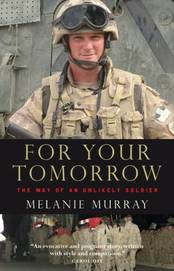 I met my friend Melanie Murray during my first full year of teaching, the year I'd just moved back to Canada, had four new courses to prepare, and hardly slept. I was always relieved to see her in the hallway outside my office--a kind, wise, and calm presence. An experienced professor of literature and composition, she was always generous with her help and course materials, but she claimed she would never publish any creative writing herself. It would have to be posthumous. Well. She's very much alive_, and in 2012 published a deeply generous account of her nephew Jeff's life and his death fighting in the Afghanistan war. As you'll see from her answers below, the book weaves myth with family history, biography with personal reaction. It elicited a huge number of responses, and it's hard to believe it's a first book. It's a compelling and beautiful read, and I'm proud to have it as the inaugural non-fiction work on Storybrain. 1. Did you have any alternate titles for the book? What made you pick For Your Tomorrow? Did that come to you fully formed at the start, or later? The title came early in the writing of the first draft. It’s the epitaph on Jeff’s headstone, and comes from an epitaph on a WW II war memorial in India: For Your Tomorrow / We gave our today. It encapsulates the answer to some of the main questions I was exploring in the book: What compelled my thirty-year-old nephew to abandon his PhD dissertation and enlist in the military? Why was he willing to risk everything in a war on the other side of the world? What does serving one’s country really mean? 2. This is non-fiction, in part a history of your family as well as your nephew's death. You had much to draw on and to cover. So where did you start--an image, a word? The seeds of the book were sown the day after my nephew was killed. It was during the long flight from Kelowna to my sister’s home in Halifax. Pondering Jeff’s life and death, I began to glimpse a mythical pattern. That night, I pulled Joseph Campbell’s The Hero with a Thousand Faces from Jeff’s bookshelf and skimmed its pages. I could see in the many passages he’d highlighted, his own story. So the tribute I wrote for Jeff’s memorial service, “A Hero’s Journey,” became the foundation for my book. 3. How did you find the sense of an ending? Did the ending remain the same through different drafts? I knew from the beginning that the last chapter would be about “Renewal,” the final phase of the hero’s journey, and that it would focus on Jeff’s legacy, particularly his son Ry, born three months before Jeff deployed for Afghanistan. But the actual contents of the chapter kept shifting as I tried to reach an ending that was life affirming. One July day, about a year after Jeff’s death, I was wading out into the Northumberland Strait with Ry in my arms; on the same shore that Ry’s father, and grandmother, and great grandfather and great great grandfather had walked. So that Zen moment became the final scene of the book. 4. Could you choose a piece of music to go with the book? Ry Cooder’s soundtrack for Paris Texas immediately comes to mind. Jeff’s love of Ry Cooder’s music is obviously reflected in his son’s name. And the stark, elegiac tone of his acoustic guitar twanging embodies for me the spirit of the book—thoughtful and sad yet somehow uplifting at the same time. 5. I know this book was very personal and difficult to write. Did finishing it change your view of the past? Writing the book brought me much deeper into my ancestral past, and made me more aware of the impact of the past on our present lives—that we carry the legacy of our familial, our cultural, and even the mythical past within us; and that they shape us in ways we’re not really conscious of. The book’s subtitle, The Way of an Unlikely Soldier, reflects this theme. In trying to understand what motivated Jeff’s radical shift in becoming a soldier, I discovered that the sign posts were pointing there all along—from the moment of his birth on Remembrance Day. As my sister lay in labour, she could hear out the hospital window the skirl of bagpipes drifting up the hill from the cenotaph. The bagpipes heralding Jeff’s birth were from the Second Battalion, Royal Canadian Regiment—the same regiment that Jeff would support to his death in Afghanistan 36 years later. 6. The voice shifts between your own and a third-person, sometimes imagined view of your nephew's life. Did this structure come naturally? Were some parts easier to write than others? The shifting points of view existed from the beginning but in a different form—more personal essay juxtaposed with biographical exploration. In the second draft I incorporated more of the devices of fiction to tell the story, creating scenes to show events and develop characters. I imagine scenes in Jeff’s life within the framework of available facts. The most difficult parts to write were the chapters set in Afghanistan. I relied on my reading about the war and the country, as well as many interviews with Jeff’s comrades. But it was a totally foreign setting and experience for me, and I was writing about real people who lived these events, and are still affected by what transpired there. So I was concerned with authenticity and capturing the spirit of the truth. 7. Images from the Afghanistan war blend with classical myth. You mix almost journalistic recounting with ancient stories. I'm interested in your thoughts about how this works in your book. I was trying to evoke a sense of mythical time, or time immemorial, as opposed to just linear time; and to show that myths are not just dead stories from ancient times, but they resonate in our present lives. As Joseph Campbell puts it, “The myths help you read the messages of the world.” They certainly helped me read my nephew’s life and death in a new and more meaningful way, and I hope they have that same impact in For Your Tomorrow.
1 Comment
Craig McLuckie
9/12/2015 10:22:24 am
Beautiful, calm, and serious discussion. Thanks.
Reply
Leave a Reply. |
ALIX HAWLEYI'm the author of My Name is a Knife, All True Not a Lie In It, and The Old Familiar. Archives
February 2021
Categories |

 RSS Feed
RSS Feed
